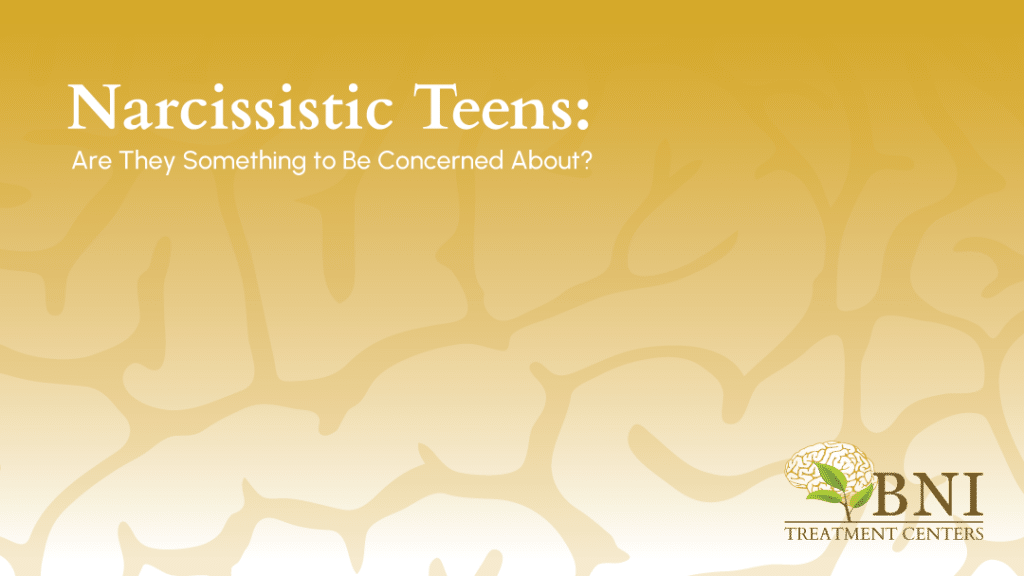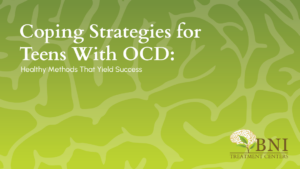
Childhood is all about learning. Part of that process is growing up and discovering that the world doesn’t revolve around them. Other people’s feelings and thoughts matter. Life exists outside of their bubble. Until then, teens can be self-centered. It’s part of growing up.
56% of teens in a 2021 study were found to demonstrate narcissistic traits. When do these traits become more than just a “part of growing up?” When does it become true narcissism, and a potential reason to seek treatment?
At BNI Treatment Centers, we work with a variety of teens, all with unique challenges and stories. Some of them could be considered narcissistic, but there’s far more to them than self-centeredness. If you think you have a narcissistic teen, you’ll want to know the information presented in this blog.
The Roots of a Narcissistic Teenager
The origins of narcissism are largely unknown. There may be a genetic component, but more research in this area is needed.
A 2015 study found a link between parental overvaluation and narcissism. The children whose parents overvalued what they did were more likely to exhibit narcissistic traits. And while some researchers theorize that a cold parenting style can contribute to the development of narcissistic traits, the above study found no link between the two. Instead, the level of parental coldness played a role in self-esteem, but not narcissism.
There may also be differences in brain structure between adolescents with narcissistic traits and those without them. One study found a link between narcissistic traits and dysfunction in neural pathways related to reward and self-relevant processing. As the study’s findings are only correlational, it remains unclear if these abnormalities cause narcissistic behavior, or if the narcissistic behavior causes the brain to change accordingly.
Individuals with narcissistic personality disorder often experience co-occurring mental health conditions, which can make the behavior more extreme.
Narcissistic Traits vs. Narcissistic Personality Disorder
There are key differences between narcissistic traits and narcissistic personality disorder (NPD). Critically, one can have narcissistic traits or tendencies without having NPD.
Narcissistic traits are behaviors or characteristics that can be related to narcissism – self-centeredness, an inability to empathize with others, or a grandiose sense of ego. Teens and adolescents especially can exhibit many such behaviors. These can show up briefly, or may be longer term aspects of someone’s personality.
However, narcissistic personality disorder requires a variety of narcissistic traits to be met in combination over a long period of time, for these traits to have a negative impact on the individual’s life, and ultimately for a diagnosis from a mental health professional. The key distinction tends to be the duration, intensity, and impact of the underlying narcissistic traits.

Signs of Narcissistic Personality Disorder in Teens
If your teen exhibits the following, their narcissistic behavior may be a sign of something deeper:
- Lack of empathy
- Feeling superior to other people
- Lack of boundaries
- Exaggerating accomplishments
- Manipulative behavior
- Arrogance
- A constant need for attention
- Extreme jealousy
- Overreaction to criticism
- Depression or anxiety
Someone with narcissistic personality disorder will consistently exhibit narcissistic behaviors. They won’t grow out of them, and they often won’t change without outside help. It’s essential to seek help for your teen if their behavior is interfering with important aspects of their life, as this disorder can exist indefinitely if left untreated.
Types of Narcissistic Personality Disorder
While there is only one official narcissistic personality disorder diagnosis, it’s often broken down into different types:
- Overt narcissism. This is the typical picture of narcissism.
- Covert narcissism. This narcissism is more subtle. It often comes with passive aggression, manipulation, blaming, and self-victimization.
- Antagonistic narcissism. This form of narcissism displays itself as competitive and domineering, frequently instigating confrontations and belittling others.
- Communal narcissism. Communal narcissism presents as selfless, empathetic and self-sacrificing actions; however, these behaviors are motivated by egotism – not altruism.
- Malignant narcissism. This is the most destructive type of narcissism, exhibiting an extreme lack of empathy, aggression, and sometimes sadism, on top of typical narcissistic behaviors.
Addressing Negative Behavior: Consequences and Empathy
Changing any teen’s behavior can feel impossible, let alone one who exhibits narcissistic traits or is living with NPD. Teens with these tendencies often don’t respond well to criticism, with reactions ranging from apathy to emotional meltdowns. Despite this, there are several tools you can use to help address negative behaviors.
Narcissists often believe they are exempt from customary rules, highlighting the necessity to set clear and firm boundaries with them. It is critical to establish straightforward rules, and ensure your teen understands both them and the repercussions should they be broken. Be consistent when enforcing the consequences. By effectively communicating why a rule is important, and then following through if it is broken, you encourage positive change.
Low empathy is common among adolescents with narcissistic tendencies, but it’s not a permanent condition. Empathy can be nurtured over time. Take every opportunity to encourage your teen to see things from others’ perspectives. Cultivate empathy further by involving them in volunteer work and guiding them to read narratives that explore diverse human experiences. By developing your teen’s empathy, you enable them to understand why their behaviors may be harmful, and promote their desire to grow.
You’re likely a role model for the teen you have in mind while reading this, even if they won’t admit it. It’s important for you to live out the behavior you want to see in them. Live empathetically and with humility, and demonstrate those traits whenever you can.

Getting Help for Your Narcissistic Teenager in Los Angeles
Raising a teen with narcissistic tendencies can be challenging, but you don’t have to do it alone. Adolescent mental health treatment is an option that will empower your teen to grow into a healthy, empathetic adult.
BNI Treatment Centers offers care to teens with mental health conditions, including narcissism and other complex diagnoses. While treatment is our top priority, education is also vital to a teen’s life. We provide services to ensure they don’t fall behind in school during their time with us. For more on what we offer, call us at (888) 522-1504.
BNI Treatment Centers: Science-based, evidence-backed, compassion-led.
FAQs
How do you discipline a narcissistic teen?
The first step is to set rules with consistent consequences, and then follow through on those consequences. Make sure that when you explain these rules, your teen understands why they are in place from someone else’s point of view. This can help them develop their empathy, and encourage positive behavioral change.
What treatments are most effective for narcissistic teens?
While every individual’s mental health treatment will be different, several therapies have proven track records of success. Cognitive behavioral therapy can help many with narcissism, as can treatments that focus on developing social skills. In some cases, transference therapy may be an effective course of action.



